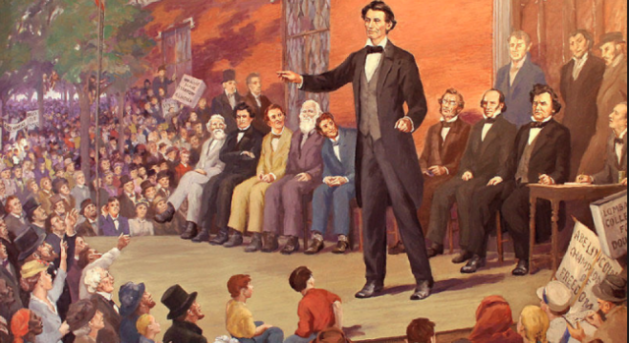
Assert, deny, project. Repeat. Photo (cc) 2016 by Gage Skidmore.
Whenever Donald Trump erupts with rhetoric that is disturbing and offensive, questions are raised as to whether the media should amplify it. My own view: Yes, usually, although it shouldn’t be repeated over and over to the point at which it drowns out all other news. President Biden is struggling to get his own message out, and surely one of the reasons is that Trump is dominating just about every news cycle — not in a good way, of course, but that hardly seems to matter.
Yet how can we ignore the reality that, on Monday, his campaign promoted Nazi rhetoric on Trump’s own Truth Social platform? Among other things, the 30-second video that was posted refers to “the creation of a unified Reich” and says that Trump will reject “globalists,” code for Jews among the far right. The Trump campaign responded with the usual drivel. According to The New York Times (free link), the response was that the video was shared by a campaign staffer who didn’t notice the Nazi content and that Biden, naturally, is “the real extremist.” The post was reportedly left up for many hours, though it was taken down Tuesday morning. Trump himself has not addressed the matter.
Please become a supporter of Media Nation for just $5 a month. Supporters receive a weekly newsletter with exclusive early content, a round-up of the week’s posts, photography and a song of the week.
What’s interesting is that, far from giving the story too much attention, our major mainstream newspapers have actually paid little attention to it. Our three national papers, the Times, The Washington Post and The Wall Street Journal, all published stories about it online. But only the Times saw fit to include it in its print edition, relegating it to page A17 of today’s paper, with no tease on the front. By contrast, there’s nothing on page one or inside the print editions of the Post or the Journal, either today or Tuesday.
Locally, The Boston Globe actually has two stories in its print edition today, as it’s the lead item in its political roundup and the subject of a metro-front story on Biden’s speech in Boston. Neither, though, is on page one.
It seems like a classic case of being caught between news cycles — too late for Tuesday print, too old for Wednesday print. The Nazi story certainly dominated the political conversation on Tuesday, but for casual news consumers who aren’t constantly plugged into social media and cable news, that’s scant consolation. Print still matters, if only as a way for editors to communicate what they think are the most important stories of the day.
The Big Three national evening newscasts actually did better on Tuesday. I downloaded the audio and plugged the files into Otter, which uses artificial intelligence to produce reasonably good transcripts. I also watched a few minutes to fill in the gaps. Here’s what I found:
- ABC’s “World News Tonight” had a story about 12 minutes into its newscast and stuck with it for almost a minute and a half. It included both the “N”-word (Nazi) and the “H”-word (Hitler) and incorporated Biden’s outraged response. There’s also this straightforward assertion by reporter Mary Bruce: “The Trump campaign is adamant this was not a campaign video, that it was reposted by a staffer who clearly did not see the word while the President was in court. But that video that included three instances of the word Reich remained on Trump’s page for more than 18 hours.”
- The “NBC Nightly News” actually mentioned the Nazi story three times. Anchor Lester Holt teased it in his opening, and reporter Laura Jarrett referred to it at about the 10-minute mark in beginning her roundup of that day’s Trump-related news before offering a 30-second story at about 11:30. Again, the word “Nazi” is used several times.
- On the “CBS Evening News,” anchor Norah O’Donnell teased the story about six minutes into the newscast, straightforwardly asserting that the term “Reich” is associated with Nazi Germany. Reporter Robert Costa then offered up some Trump news that provides the most thorough overview of the three networks, pivoting from the post and Biden’s reaction to this: “It’s not the first time Trump has used rhetoric prompting outrage for its echoes of hateful extremists.” That’s followed by some of Trump’s worst comments over the years, from saying that immigrants “are poisoning the blood of our country” to “radical left thugs that live like vermin.”
All of this matters because the three evening network newscasts are the closest thing we have left to a mass medium, with a combined audience of nearly 20 million. By contrast, Fox News, which attracts by far the largest audience of the three cable news stations, has an average of about 2 million viewers in prime time, generally defined as 8 to 11 p.m.
I harbor no illusions that Trump’s latest dalliance with Nazi and antisemitic rhetoric is going to have a lasting effect. It all played out in a manner that we’ve seen over and over: assert, deny and project — and then quietly remove the offending message after it’s accomplished its purpose of assuring the far right that he’s one of them. Stand back and stand by, everyone. It’s going to get a lot worse.





